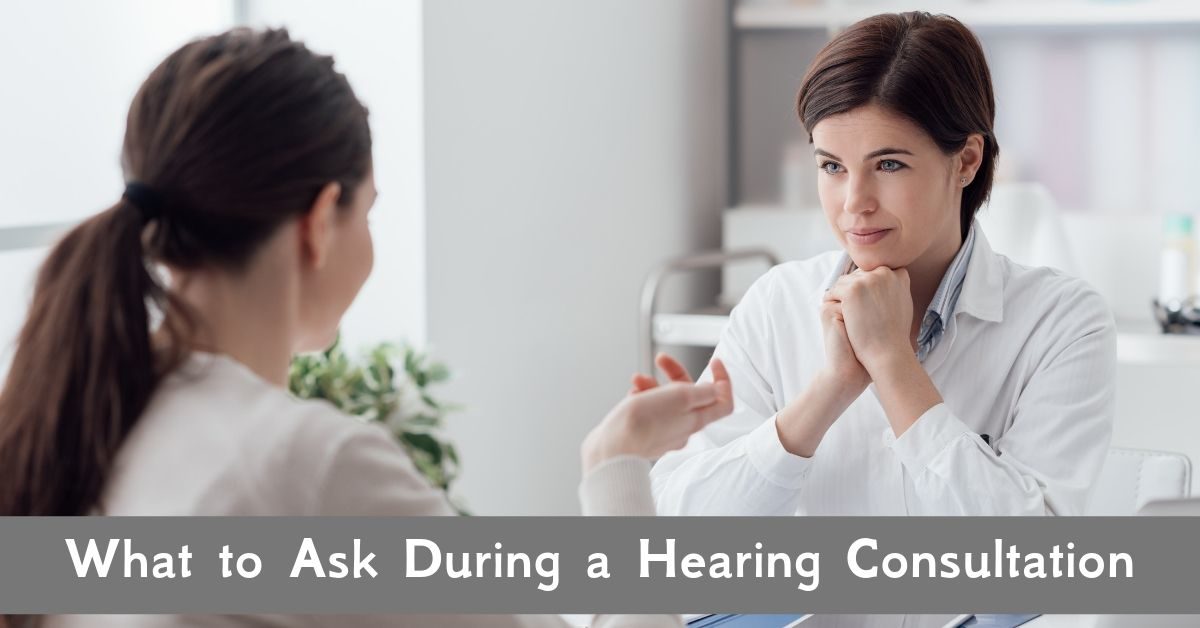Congratulations! If you’re here to read about hearing consultations, then you have made the first crucial step towards your hearing health. Since neglected hearing loss contributes to a host of other health conditions and continues to negatively impact your daily communications, the sooner you have the check-up, the sooner you can chart a course to a healthier, fuller hearing experience.
Now that you have decided to visit a hearing health professional, let’s get started on some of the ways you can prepare for, and what you can do to get the most out of a hearing assessment.
Hearing Tests
All of these exams are simple and noninvasive, so there’s no need to worry!
- Physical: An exam of your ear will be conducted to rule out infections, inflammations or excessive earwax as well as, any physiological factors that might contribute to your hearing condition.
- Whisper test: The hearing specialist will record your responses to spoken words at varying volumes with one ear covered.
- Tuning fork test: Tuning forks are made up of two metal prongs when struck, the frequencies emitted, can help doctors detect damage to our hearing.
- Audiometry test: These tests are more comprehensive and will address a wider range of hearing frequencies that you may or may not be receptive to dependent upon your condition.
Types of Hearing Loss
There are three main types of hearing loss. Bear in mind that hearing loss is greatly affected not only by our age, but also by our genetics, lifestyle choices, medications, and environmental factors.
- Conductive: Also known as CHL, applies to any restriction of sound waves traveling the outer ear, eardrum or middle ear.
- Sensorineural: Also known as SHL, applies to damage incurred in the inner ear or neural networks from the inner ear to the brain.
- Mixed: A combination of the two mentioned above.
Things to Do Before Your Hearing Test
- Make a list of any and all medications, including vitamins and supplements, you are currently taking.
- Make a list of any chronic conditions you have or had including ear infections or surgeries.
- Make a list of your work experiences that left you exposed to a loud environment.
- Make a list of symptoms you have noticed and when they started.
- Ask a friend or family member to help you make notes on any hearing loss. symptoms you might have. Quite often others close to us notice things that can be of use to our doctors.
- Ask a friend or family member to accompany you if you are feeling apprehensive.
What to ask your hearing health professional:
- What type of hearing loss do I have?
Knowing the kind of hearing loss you have will enable you to discuss treatment options with your doctor and anticipate any changes that might occur. There are many paths to maintain and enhance the natural hearing process you retain. A comprehensive look at your options and at an overall treatment plan discussed with your doctor will empower you to know which directions to take.
- Will wearing hearing aids help?
Depending on the type of hearing loss you are afflicted with and its degree of severity, your hearing health professional will be able to answer that question best. They will take into account your history and test results so it is best to be open and honest with them about your needs and experiences. The early use of hearing aids can help slow the process of hearing loss and facilitate normal hearing capacity dependent upon the person’s condition.
- Is the hearing loss the same for both ears?
Not necessarily. Different sides of our brain process different types of information and that follows suit for our ears when we process sound. According to a study funded by National Institute on Deafness and Other Communicative Disorders (NIDCD) researchers confirmed that “The left side dominates in deciphering speech and other rapidly changing signals, while the right side leads in processing tones and music.”
- Will I need hearing aids in both ears?
Chances are good that you will. Over 90% percent of hearing loss cases require the use of hearing aids in both ears. This is to the benefit of the user so that they can maintain and sustain a fuller, natural hearing experience.
- Which type of hearing aids do I need?
If a hearing loss is detected, your hearing profession will work with you to find the best devices for your needs. Your lifestyle and work environment and your particular condition will let the audiologist know what will work best for you. There is a huge variety of hearing aids to choose from at varying costs, and they cater to a large spectrum of hearing needs. They are also increasingly sophisticated in design and technologically advanced for the user’s specific requirements. Some are designed to be completely hidden and have apps that can be used to set them from your phone.
Absolute Audio
Absolute Audio is here for any assistance you may need. It is our goal to accommodate any questions or queries you, or a loved one, may have regarding the health of your hearing. With your first appointment, we can start to facilitate a life-long experience of the betterment of your auditory health.

